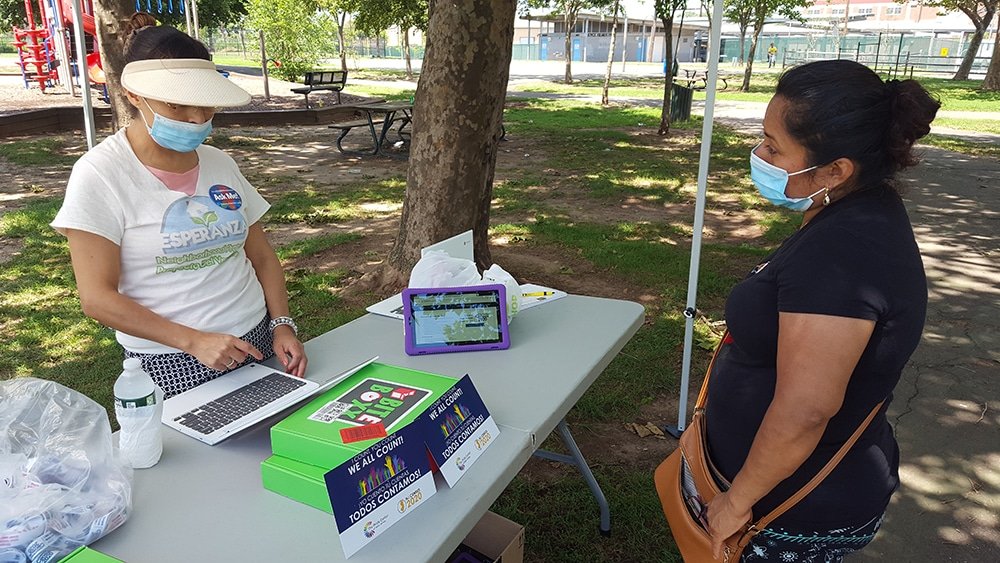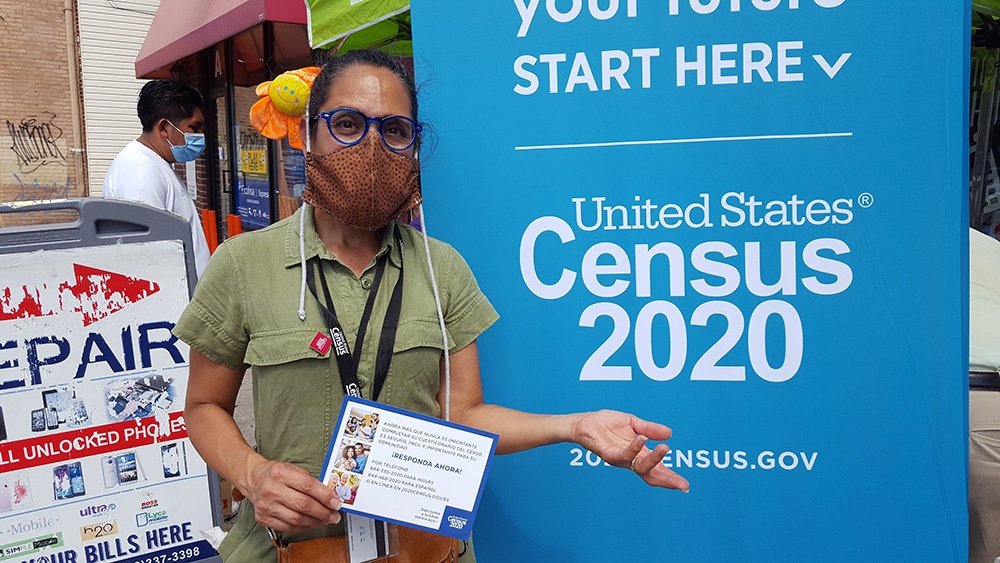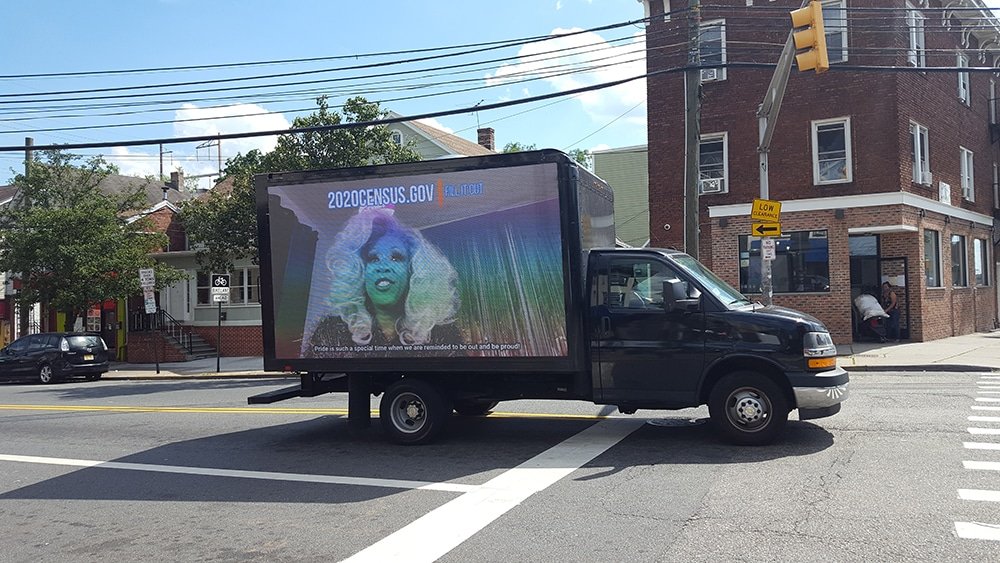By Kleibéel Marcano, Reporte Hispano
Editor’s note: This is the English translation of the original story, which was first published in Spanish for Reporte Hispano. This version has been updated and edited, with permission from the author(s) and publication(s), for length and clarity.
——
PRINCETON, NJ — With barely 45 days left before all census efforts end, several Census Bureau officials, along with community organizations in New Jersey, have recently drummed up the campaign to encourage more Latinos to participate in the decennial count.
The main goal: increase the census response rates in the state’s hard-to-count (HTC) communities, including New Brunswick, in Middlesex County.
As of July 30, 2020, the county’s auto-response rate was 69.2%, much higher than the state average of 64.8%. However, in New Brunswick—the county’s largest city—the response rate was just 41.3%, more than 2 percentage points lower than the national response average of 62.8%.
“New Brunswick is a difficult city to count because it is home to many university students, immigrants, people who do not speak English or are fearful about their immigration status,” said Karen Ford, communications director of The Pride Center of New Jersey, who conducted a caravan to urge more people to participate the 2020 Census.
According to 2010 Census data, there are nearly 60,000 people who live in New Brunswick, of which 49.93% are Hispanic and 16% black.
Minority groups (Latinos, Blacks and Asians), immigrants, children under 5 years old, and renters are considered hard-to-count population groups. Some of the barriers to counting these population groups include: limited English language proficiency; distrust in government; residence in multi-family dwellings; addresses not in the Census database; and limited or no access to the Internet.
Stepping on the “accelerator”
Last week, at Joyce Kilmer Park, in New Brunswick, volunteers from the Esperanza Project organization set up three Census kiosks. They stopped passersby and encouraged them to fill out the census questionnaire.
“Many of these people are honest. Some would admit that they did not receive the questionnaire or have no documents. Others are afraid or beliew that the census is only for those who are in the country legally,” said Celmira Cordero, a volunteer from the Esperanza Project. “We explained to them that everyone, regardless of legal status, must fill out the census form.”
Margarita Garcia was one of New Brunswick residents who was encouraged to fill out the form at the Census kiosk.
“I needed help to fill it out and they (the volunteers) helped me do it in my language (Spanish). It was my first time. In 2000 [and 2010], I did not participate in the census,” said Garcia. “I was told that it is important for the children’s school, so that they would receive enough federal funding, and that’s why this time I filled out the census form.”
Garcia, an immigrant from Mexico, lives with her two children, her husband and her brother-in-law, and she made sure they were all counted.
Leonardo Vásquez also filled out the census questionnaire at the kiosk.
“The young volunteer told me that it is important for the community,” said Vásquez, who lives by himself. “I am here to help as much as I can.”
Milagro Slee, another Esperanza Project volunteer, said they registered more than 30 families at the Census kiosk that they had previously set up at the Paul Robeson Community School for the Arts. It was during the hours when parents were picking up their children for lunch.
Trusted voices
Tahirih Gómez-Smith, U.S. Census Bureau’s community outreach specialist for Hispanic communities in New Jersey, said that, in July alone, a number of volunteers set up Census kiosks at 1,300 schools in areas with low response rates, motivating and helping residents to fill out the questionnaire.
Gómez-Smith, who was present at the Census kiosk that the Hyacinth organization installed outside the Latino Supermarket on French Street, in New Brunswick, pointed out that through these efforts, with the help of faith-based and community organizations and local businesses, are important because the message comes from “trusted voices of the people.”
The challenges in cities like New Brunswick, according to Gómez-Smith, stem from fear, language barrier, and the lack of information about the importance of the census.
Betting on $45 billion
Ford of The Pride Center explained that each person who is not counted represents a loss to his or her community.
“For each individual who does not participate in the 2020 Census, it represents a loss of income of approximately $2,000 in funding per year. So, during the 10 years between each decennial count, that equates to approximately $20,000 that the government will not reallocate to their city or its town. That adds up to millions of dollars in losses for the state,” Ford said.
Census information determines the federal government’s allocation of $675 billion nationwide. If the population of New Jersey were correctly counted, the state would be entitled to an allocation of $45 billion from the federal government, according to various sources.
These funds go to programs and services that directly affect all residents in the areas of health care, education, housing, food security, infrastructure, emergency preparedness, and other essential services, Ford and other community leaders stress.
Additionally, the Census data determines how many representatives each state has in Congress, according to U.S. law. Since 1980, New Jersey has lost three seats due to Census undercounts and population change.
Reducing the census period
Peter Chen, a political advisor for the Advocates for Children of New Jersey (ACNJ), said in an interview: “The consequences of an undercount could be devastating for communities. Billions in federal funds are distributed based on Census counts. If an area is undercounted, that area may receive less funding for roads, hospitals, schools, healthcare and more.”
Chen, who has been working with organizations in New Jersey to promote the census, cautioned that minority groups, immigrants and people who speak a language other than English are less likely to respond. As a result, these communities may lose critical funds for the services they need.
As news circulated about the Trump administration’s attempt to cut census operations short, many have expressed an alarming concern that minority communities are not going to be fully counted.
Reducing the time period for the census response dramatically increases the risk of an undercount, Chen said.
“The New Jersey 2020 Census Coalition has written a letter to Congress urging that census extensions be included in the next pandemic relief package. Congress, not the president, has the ultimate responsibility for ensuring an accurate count of the census,” Chen added. “No census has had to face this level of challenge or political interference. The Census Bureau experts asked for an extension because they need it. We cannot afford to cut corners when the consequences of the recount affect the funding of a decade.”
Editor’s note: Until September 31, you can fill out the census online at www.2020Census.gov, by phone (844-468-2020, Spanish phone line) or by sending the questionnaire by mail.
This story was part of the “2020 Census: New Jersey Media Counts,” an initiative of the Center for Cooperative Media at Montclair State University.



